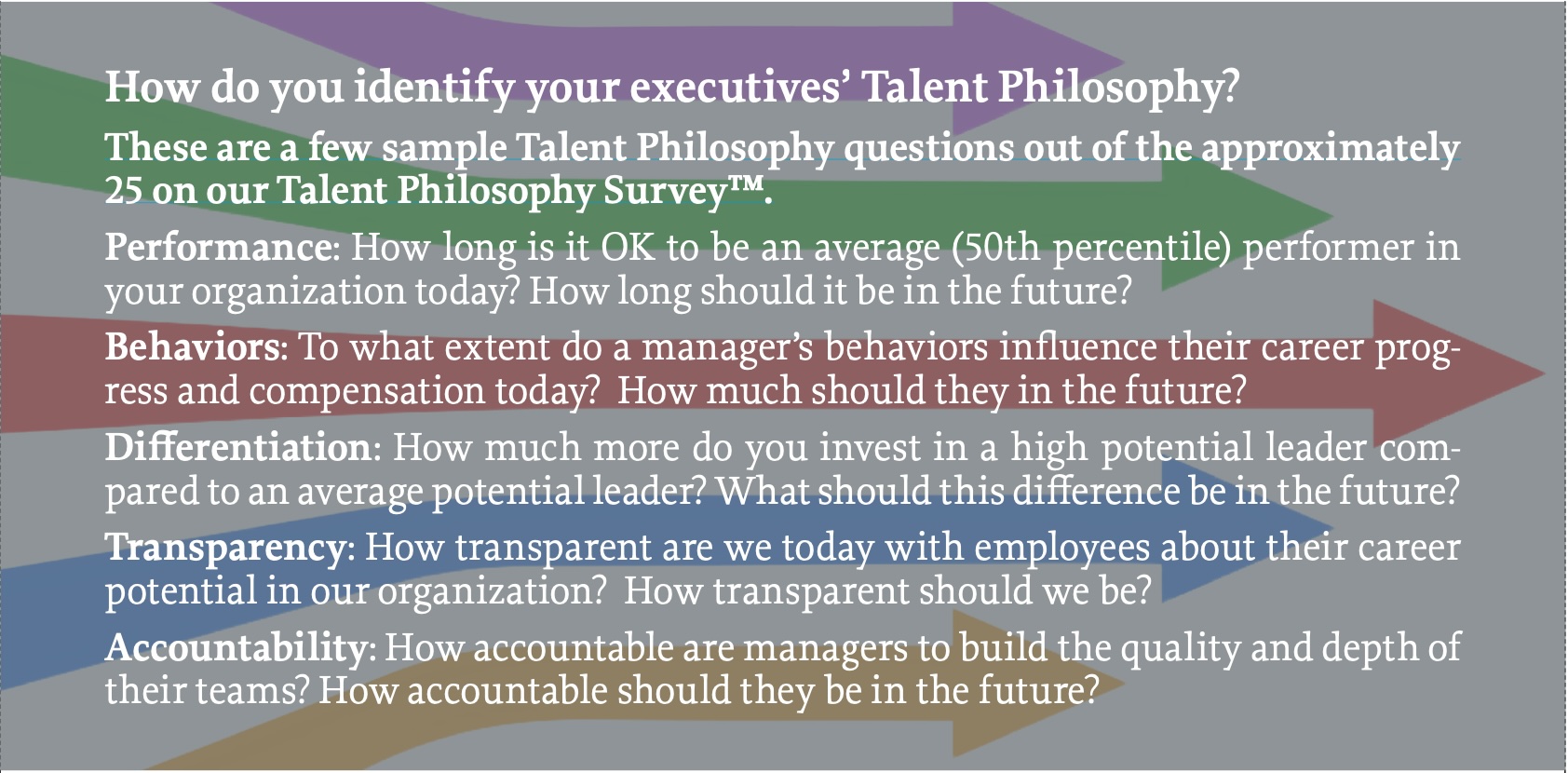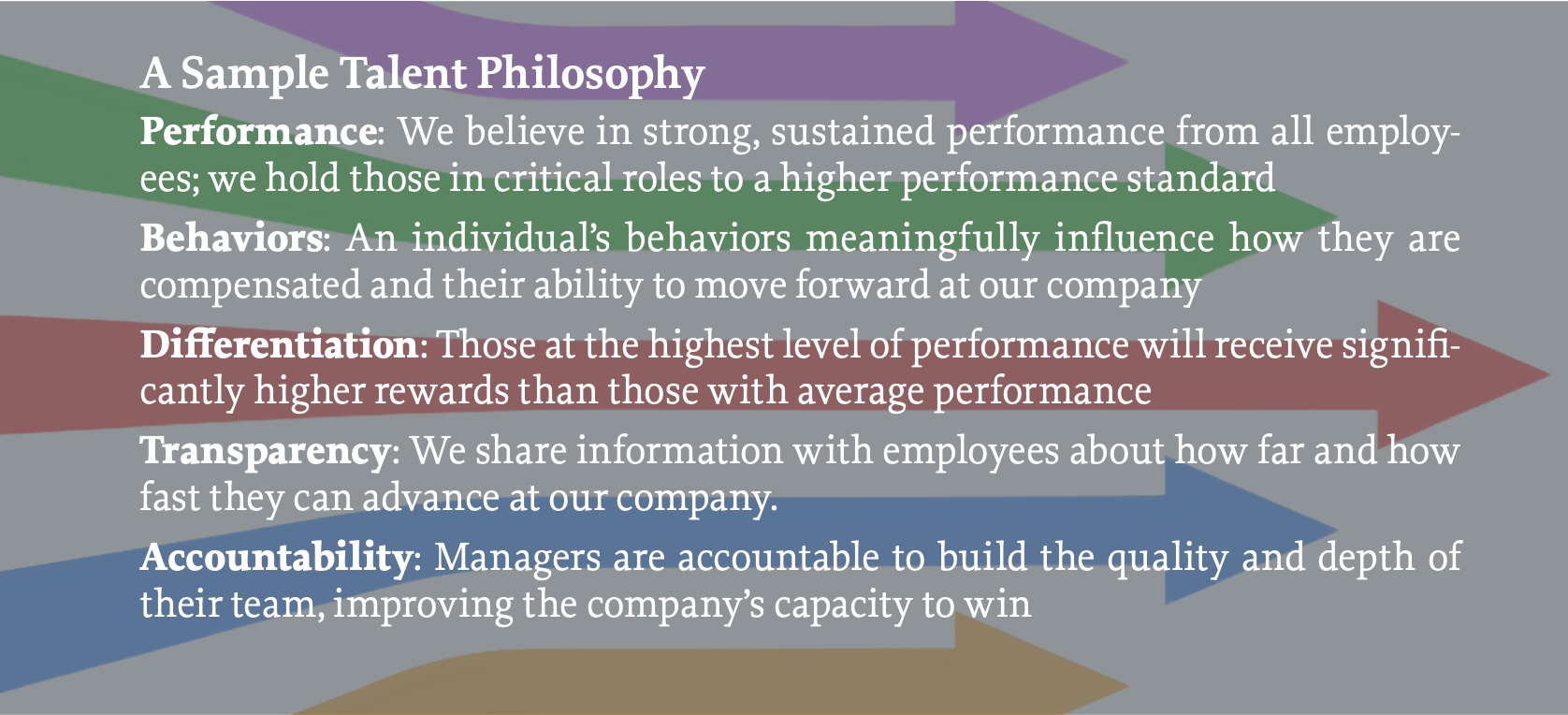What’s Your Talent Philosophy?

At Consolidated Snacks, the product management team meets quarterly to review market share and revenue data for its 18 salty snack products. The team uses this data to allocate their limited marketing budget. They have also created a handful of guidelines to ensure that their investment decisions consistently reflect the company’s product management philosophy.
Among the team’s guidelines are that products showing strong sales growth will receive three times the marketing investment of products with average growth. They’ve also agreed that products that are not growing and in the bottom quarter of sales will be culled to make room for new products.
The team believes that those guidelines and a few others help to ensure fact-based, objective decision-making. As an added benefit, the guidelines guarantee that everyone in product development, manufacturing and marketing understand Consolidated’s requirements for a product’s success.
At this quarter’s review, Marketing VP Susan Smith shook her head with disappointment when the conversation turned to Caribbean Corn Crunchers. She was the product manager who had originally launched the spicy corn chip and she had invested significant personal capital in its success.
Yet, after a strong start, Crunchers hadn’t captured meaningful market share and was performing below its competitors. The group agreed that it was unlikely that Crunchers would ever become the category leader they had hoped.
Susan was emotionally committed to the product but made the tough decision to sharply reduce the snack’s marketing investment consistent with the team’s decision-making guidelines.
A senior team unemotionally managing their product portfolio using a consistent set of guidelines may seem unremarkable to you. After all, it would be chaos if every product manager at Consolidated Snacks made investment decisions according to their personal preferences.
Products with similar sales potential might get wildly different marketing and promotion investments. Products needing to be culled might remain in the product line, diverting resources from more promising new entrants. Disciplined, rule-based decision-making would seem essential to properly manage any aspect of their business.
So, what if we substituted the word “talent” for “product” in the scenario above? Could you say that your company has:
- Clear guidelines for how long it’s OK to be an average (50th percentile) performer?
- Executive team alignment about how much to differentiate the investment in high performing employees compared to average performers?
- A consistent approach for how transparent communications are with employees about their performance, behaviors and potential to advance?
If you answered “no” to those questions you’re not alone. While our clients are the world’s premier organizations, very few of them previously had any operational guidance for how to manage talent.
If clear, consistently applied guidelines support quality decision making in other parts of the business, they can surely add value to talent management decisions as well.
Why you need a Talent Philosophy
A company’s explicit or implicit answers to questions like those above comprise its Talent Philosophy – how it plans to manage talent to achieve its strategy. Given that few companies have an explicit Talent Philosophy, managers’ individual preferences and biases often guide the important choices made about employees’ careers.
These individual preferences can create huge variations in the quality, depth and engagement of talent. Depending on the manager, a high potential employee might be aggressively developed and disproportionately rewarded or receive just a token recognition of their ability.
A high performing employee with less than perfect behaviors might be quickly promoted by one manager who only values results or held back by another until those behaviors improve.
If your organization is trying to build specific capabilities or deliver a consistent employee experience, the lack of a Talent Philosophy sharply undercuts those efforts.
Without an explicit Talent Philosophy employees must infer their company’s “rules of the road” by observing how talent-related decisions are made.

If they perceive that promotions emerge from a black-box process, they’ll assume that favoritism and politics bias that process. If they don’t understand why some employees receive out-sized rewards, they’ll assume the company is fundamentally unfair in its compensation approach.
Companies without a clear Talent Philosophy face far more serious consequences than just having autonomous managers and confused employees. Without a consistent set of rules for how talent should be managed, companies risk:
Increased turnover of high potentials: Your company’s highest potential leaders will be especially sensitive to lack of transparency about their future or unexplained inequitable treatment. They won’t whine; they’ll just leave.
Decreased engagement: The elements of a Talent Philosophy heavily influence the factors that create employee engagement. If managers aren’t accountable to develop their teams or bad behaviors are left unchecked without explanation, engagement of your best talent will take a hit.
Confusion over whose “rules” to follow: Without a Talent Philosophy, managers will rely on their personal preferences and biases to guide how they manage and grow their teams. Team members will interpret their manager’s actions – good or bad – as the company’s Talent Philosophy.
Employees can adapt to a wide variety of talent philosophies. What they want is clarity about what the “rules” are and to see those rules consistently applied.
How to Create a Talent Philosophy
A complete Talent Philosophy should provide employees and managers guiding principles for:
Performance: What are the consequences of higher or lower employee performance over time?
Behaviors: How much do behaviors matter and at what thresholds do we start to care?
Differentiation: How should we allocate our company’s resources and rewards across varying levels of performance and potential?
Transparency: How open should we be with employees about their performance, behaviors and potential to advance?
Accountability: To what extent should managers be responsible for increasing the quality and depth of their teams?
We sometimes include Development as a factor, but this can get too specific and dictate policy rather than provide guidance.
You’ll notice that each of the factors above has a range of acceptable responses. You can choose to make behaviors incredibly important or somewhat important. You might want full transparency or moderate transparency.
What you don’t see are platitudes that don’t provide managers with guidance for how to make talent decisions. Statements about “We value all talent” or “We only recruit the world’s top talent” are meaningless and don’t belong in a talent philosophy.
Also, factors where there is only one right answer like “we fully support an inclusive environment” are great values but don’t represent a philosophical choice.
The Process
It’s a straightforward, not necessarily easy, process to develop and implement a Talent Philosophy. We’ve built more than 100 talent philosophies and use the following flow for the best results.
- Get senior team input and consensus: A Talent Philosophy is your executive team’s preference for how to manage talent. We listen to their views using both a structured survey (see the box for sample items) and interviews to help explain the concept and understand their points of view.
We consolidate the findings and discuss them with the executive team to gain agreement on each Talent Philosophy area. It’s not critical to have perfect alignment but it is essential that each executive agrees to manage their group consistent with the team’s decisions.
We find that executive teams value this discussion and are often very progressive on topics like transparency and accountability.
Understanding and implementing their point of view also makes your life easier as an HR leader. They’ve been clear about the direction they support. All you have to do is help make it a reality.
2. Conduct a reality check: It’s easy for executives to give socially desirable responses when asked Talent Philosophy questions. Should we hold leaders to higher performance standards? Absolutely! Tell high potentials about their status? Of course! Hold managers accountable for great leadership? You bet!
This makes it important to model the real-world implications of those decisions before finalizing a Talent Philosophy. Apply the draft principles to a few recognizable employees types and test executives’ reactions to the projected consequences.
That “Steady Eddie” Finance Director with the great attitude and two kids in college? He’s been here 15 years, never received more than the middle performance rating and has little possibility of promotion. Your proposed rules say that he’s out in a year unless his performance improves or he shows potential to advance.
Are you ready to tell him that? Use insights from this reality check to fine-tune your final Talent Philosophy.
3. Align your HR processes and communicate to employees: Once your executives have aligned on the philosophy, modify your HR processes to enable them. Talent review, performance management, development and compensation processes will all likely require adjustments to consistently support your new philosophy.
There should be no daylight between how your executives pledge to manage talent and how people experience being managed.
4. Transparently and repeatedly communicate the Talent Philosophy to your managers and employees. Managers need to understand your company’s expectations for how they should manage talent and the consequences of doing that well or poorly. Employees need to know what the rules are for succeeding in your organization.
Your talent philosophy should be integrated into your selection processes (“this is how we manage talent”), performance management (“is this people manager acting consistent with the philosophy?”), leadership development (“let’s explore each element and how to demonstrate it”) and so on.
Lessons Learned
There are clear lessons from our 100+ experiences creating a talent philosophy. A few that you should take to heart include:
- It’s the executive team’s philosophy, not HR’s: Their commitment comes from their active participation in creating the document. Do not write this in HR and advance it to the top team for approval. And, certainly do not write it in HR and try to implement it on your own.
- Provide short, clear direction: A talent philosophy provides direction and guardrails to guide consistent decision-making. The fewer words you use for each element, the better.
Think that’s too challenging? Our favorite Transparency statement is “Employees Know Where they Stand.” That’s five words but it speaks volumes. Give yourself one sentence per category of less than 15 words.
- Treat communications and implementation as culture change: While we never call Talent Philosophy a culture change process, if will shift your company culture because people will experience being managed in a different way.
This means that you must manage Talent Philosophy with the same long-term mindset and approach as a culture change initiative. It needs to be visibly and vocally reinforced over years.
Executives need to speak to it. HR needs to conspicuously mention it when speaking of any people process. It should be integrated into the fabric of the company so that employees and managers see it every day.
In Summary
A Talent Philosophy will ensure that your company has a disciplined approach to making talent decisions and that your employees feel that decisions that affect their careers are being made in a fair and unbiased way.
It provides the foundation for talent management success. It aligns your executive team around a common vision. It clarifies for your employees how to succeed. It provides a “true North” around which to design your HR practices.
We’ve been surprised by the incredible power of this seemingly simple activity and now recommend it to every client as the mandatory starting point for talent management success.
